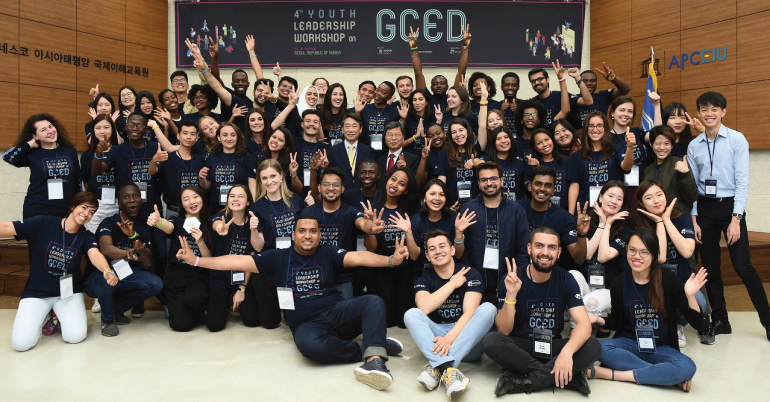STUDENTS
Program Eligibility
Global UGRAD is open to all academic fields of study and does not discriminate on the basis of race, color, gender, sexual orientation, religion, ethnicity, or disability. Competition for the program is highly competitive and merit based. Finalists will be selected on the basis of academic excellence, leadership potential, and their preparedness for study in the U.S.
The Global UGRAD Program is open to anyone who is/has:
- over 18 years of age;
- a citizen of a Global UGRAD participating country*, currently residing in that country;
- enrolled as an undergraduate in good standing at any accredited university, public or private, and has at least one semester remaining at their home university at the conclusion of the Global UGRAD program;
- completed secondary education in their home country;
- a solid command of written and spoken English (English Language training for some finalists is possible);
- able to begin studies in the U.S. in August 2018 or January 2019 (selected participants may not defer to a later date);
- eligible to receive and maintain the U.S. student exchange visa (J-1) required for the program;
- cleared by a physician to participate in the program;
- committed to returning to their home country after the completion of the program.
Individuals in the following circumstances are not eligible for the Global UGRAD Program:
- U.S. citizens and permanent residents of the U.S.;
- Individuals currently studying, residing, or working outside of their home country;
- Local employees of the U.S. missions abroad who work for the U.S. Department of State and/or the U.S. Agency for International Development (USAID); employees are also ineligible for one year following the termination of employment;
- Immediate family members (i.e. spouses and children) of U.S. Department of State and USAID employees; family members are also ineligible for one year following the termination of employment;
- Current World Learning employees and their immediate family members
Participating countries/locales include: Algeria, Albania, Armenia, Azerbaijan, Bahrain, Bangladesh, Belarus, Bosnia-Herzegovina, Burma (Myanmar), Cambodia, China, Costa Rica, Dominican Republic, Egypt, El Salvador, Georgia, Guatemala, Haiti, Honduras, India, Indonesia, Israel, Jordan, Kazakhstan, Kenya, Kosovo, Kuwait, Kyrgyzstan, Laos, Lebanon, Macedonia, Malawi, Malaysia, Maldives, Mauritania, Moldova, Mongolia, Montenegro, Morocco, Mozambique, Nepal, Nicaragua, Niger, Oman, Palestinian Territories, Panama, Paraguay, Philippines, Russia, Saudi Arabia, Serbia, South Korea, Sri Lanka, Tajikistan, Thailand, Turkmenistan, Ukraine, Uzbekistan, Venezuela, Vietnam, and Zimbabwe.
HOST INSTITUTIONS
World Learning partners with over 70 diverse colleges and universities around the U.S. to make the Global UGRAD Program a success. Is your institution interested in becoming one of them?
Host Institution Frequently Asked Questions
How can I become a host for the Global UGRAD program?
If you are interested in hosting Global UGRAD participants, please complete the online application form.
What countries/locales are represented by the Global UGRAD program?
Participating countries/locales include: Algeria, Albania, Armenia, Azerbaijan, Bahrain, Bangladesh, Belarus, Bosnia-Herzegovina, Burma (Myanmar), Cambodia, China, Costa Rica, Dominican Republic, Egypt, El Salvador, Georgia, Guatemala, Haiti, Honduras, India, Indonesia, Israel, Jordan, Kazakhstan, Kenya, Kosovo, Kuwait, Kyrgyzstan, Laos, Lebanon, Macedonia, Malawi, Malaysia, Maldives, Mauritania, Moldova, Mongolia, Montenegro, Morocco, Mozambique, Nepal, Nicaragua, Niger, Oman, Palestinian Territories, Panama, Paraguay, Philippines, Russia, Saudi Arabia, Serbia, South Korea, Sri Lanka, Tajikistan, Thailand, Turkmenistan, Ukraine, Uzbekistan, Venezuela, Vietnam, and Zimbabwe.
What is the age group of the Global UGRAD finalists?
Global UGRAD participants have completed 1–4 years of university study in their home countries. The age range is typically 18–25 years old.
What fields of study are mostly represented in the program?
Students from all academic disciplines are encouraged to apply for the Global UGRAD Program. Possible fields of study include the humanities, arts, social sciences, mathematics, natural and physical sciences, engineering, and applied sciences.
Are the participants degree-seeking students?
No. All Global UGRAD students are non-degree seeking students in the U.S.
Is community service a required program component?
Yes. All Global UGRAD students are required to complete 20 hours of community service.
Do the students have to participate in an internship?
No.
Are the students expected to live on campus or off campus?
All students are required to be housed in campus facilities with an American roommate. Students often prefer single sex residence halls when available.
Does the program provide health insurance coverage for the participants?
Health coverage is provided through the Accident and Sickness Program for Exchanges (ASPE). ASPE is a self-funded, limited health care benefit plan designed to pay covered medical expenses for eligible exchange participants. Covered medical expenses are subject to limitation and pre-existing conditions are not covered. This plan is not an insurance policy. Therefore, if the participant should have any serious medical care, he/she should seek additional health insurance on their own behalf.
What kind of support is expected from participating host Institutions?
World Learning is looking for host institutions who are able to provide a high level of academic, cultural, and personal support to participants. Resources such as career centers, tutoring centers, international student services and other support centers play an integral role in the students' successful experiences.
Is financial support (cost share) from host institutions an expectation?
Host institutions are expected to demonstrate significant cost share commitments. Examples include in-state tuition instead of out-of-state, housing waivers, significant tuition discounts or scholarships, and housing and fee reductions.
ALUMNI
Have an idea for a community project? To learn about the U.S. Department of State's Alumni Exchange Innovation Fund (AEIF), visit the Bureau of Educational and Cultural Affairs' AEIF Website.
All Global UGRAD alumni are invited to join International Exchange Alumni , a network created and facilitated by the U.S. Department of State. To access alumni resources and more, log-on to International Exchange Alumni.
link to Apply:https://www.worldlearning.org/projects/global-ugrad/My U.S. experience has changed me as a person and has made me more confident. I believe I can achieve my career related dreams.




